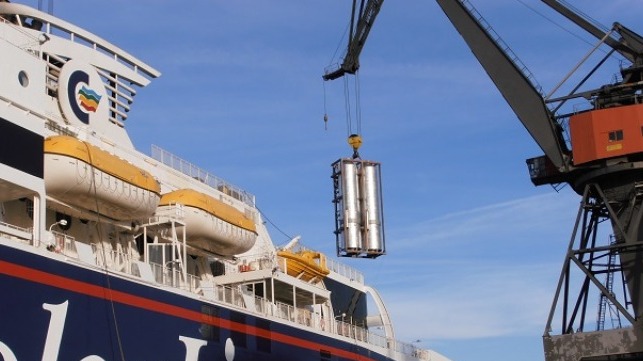 Scrubber installation in progress (file image)
Scrubber installation in progress (file image)
By The Maritime Executive 2019-11-18 21:44:00
Malaysia has joined the list of nations and regions moving to ban the use of open-loop exhaust gas scrubbers in the run-up to the IMO2020 sulfur cap implementation.
“Malaysia prohibits the discharge of washwater from [open-loop scrubbers] whilst in Malaysian water (12 nautical miles from the nearest land),” said maritime regulator Jabatan Laut Malaysia in a statement posted to its site November 12. “Ships calling to the Malaysian ports are advised to change over to compliance [sic] fuel oil or change over to close loop system (if hybrid system) before entering Malaysian waters and ports.”
The agency also posted a notice of intent to enforce the new IMO2020 fuel sulfur cap of 0.5 percent when it enters into effect on January 1.
Open-loop scrubbers use seawater to capture sulfur oxides from the vessel’s exhaust stream, reducing SOx emissions to a level that is equivalent to or below that produced by burning compliant 0.5 percent-sulfur fuel. The washwater is discharged into the marine environment, raising concerns about whether smokestack pollutants are being shifted from one discharge route to another. Singapore, Fujairah, California, Belgium and China have already implemented partial or full bans on open-loop scrubber discharges.
The Clean Shipping Alliance, a scrubber industry association, says that its testing shows minimal impact on water quality from scrubber washwater. The CSA’s study, commissioned from environmental research institute CE Delft, found that accumulated concentrations of scrubber washwater contaminants in seaports are at very low levels and well below regulatory limits. The results are similar to those from a study conducted by Japan’s Transport Ministry and from extensive data gathered aboard Carnival’s scrubber-equipped cruise ships.
CSA also points to scrubbers’ environmental benefits for port residents. Air pollution has been found to cause low lung function and is often associated with other health problems, including cancer, cardiovascular and dermatological diseases. “The industry must not lose sight of the reason behind the introduction of the global sulphur cap and the effect sulphur oxide emissions has on human health. Marine exhaust gas cleaning systems are the best way of reducing shipping’s environmental impact by preventing air pollution whether a ship is at sea or in port,” said CSA 2020 Chairman Mike Kaczmarek, VP of Carnival Corporation.
source:www.maritime-executive.com


